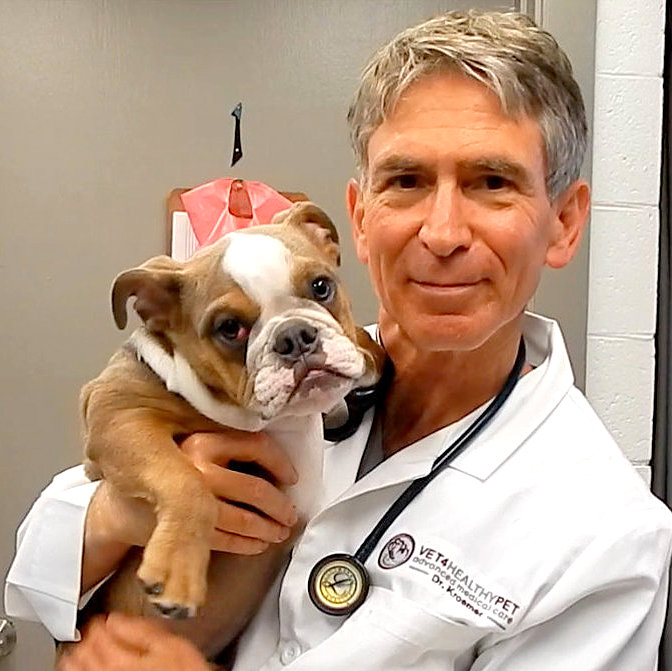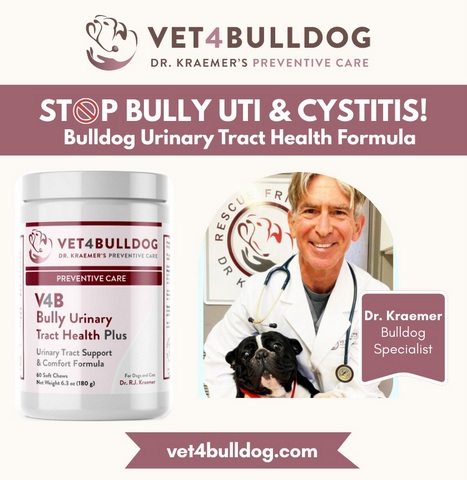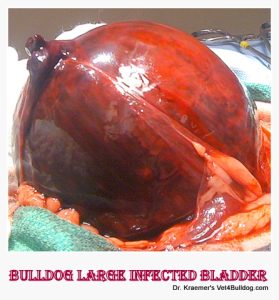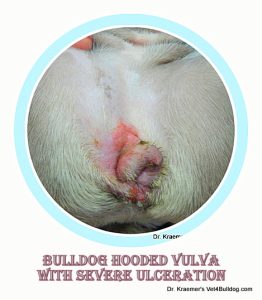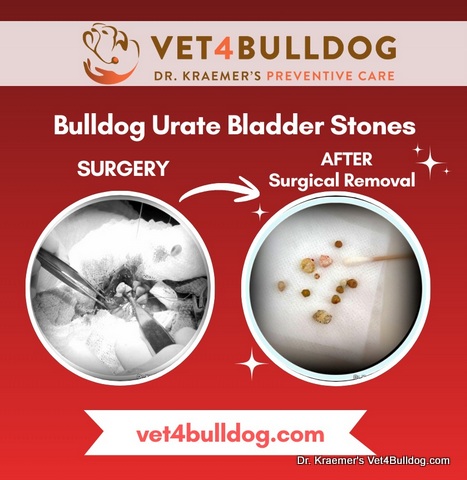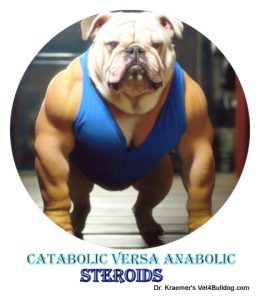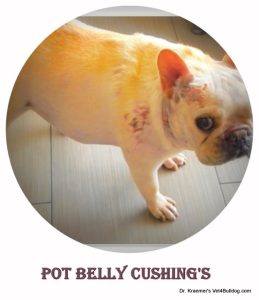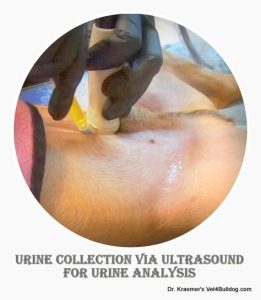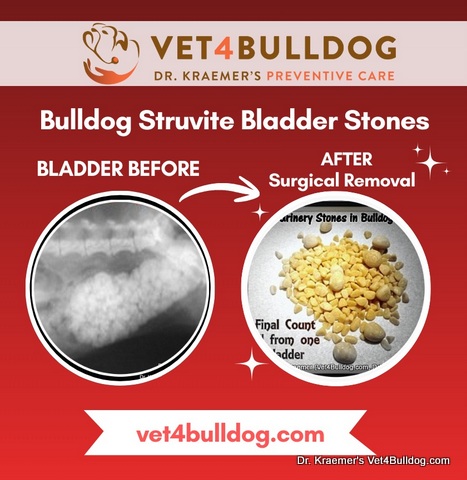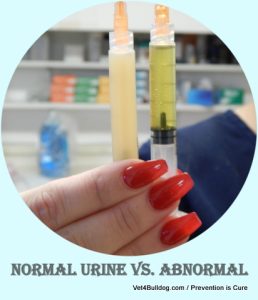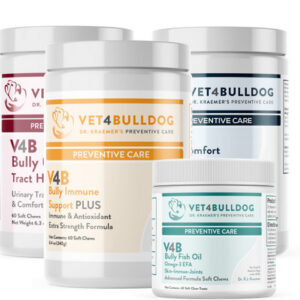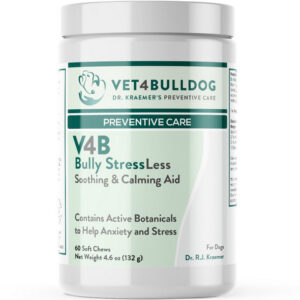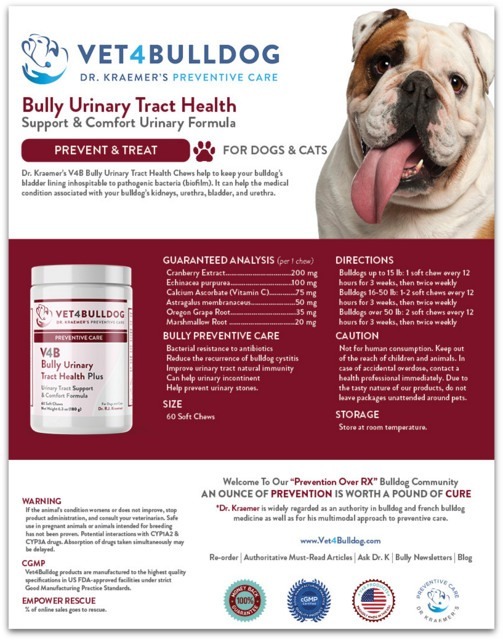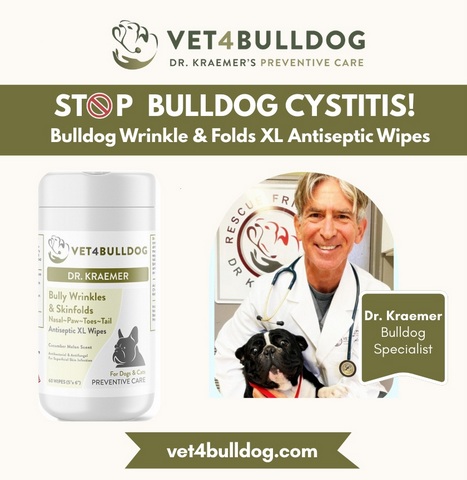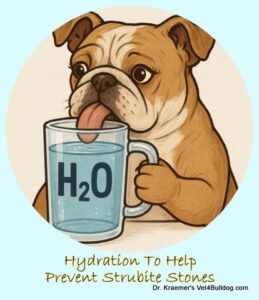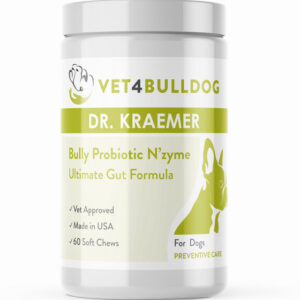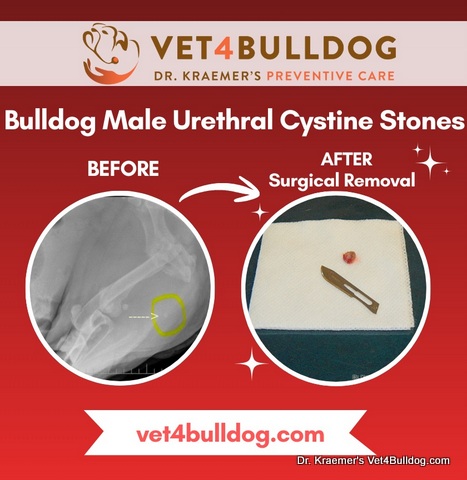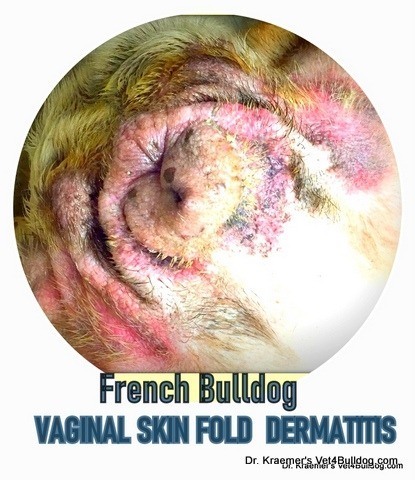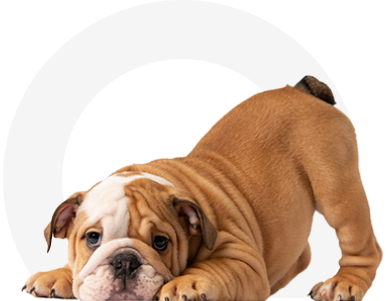Introduction To Bulldog Cystitis and UTI
Bulldog cystitis is a medical condition characterized by inflammation of the bladder.
It’s crucial to understand that inflammation of the urinary tract does not always indicate an infection.
Urinary Bladder Inflammation Versa Infection
Although many cases of cystitis are triggered or aggravated by urinary tract infections, it can also occur as a sterile condition, with no detectable pathogens in the urine. This type of sterile inflammation may arise from various causes or be linked to underlying conditions unrelated to bacterial infection.
Other contributing factors can also serve as a trigger for cystitis in bulldogs.
Examples are:
Bulldog cystitis is usually due to an infectious bacterial origin (a UTI).
Cystitis in Bulldogs/ ANATOMY & FUNCTION:
Bulldogs and French bulldog’s kidneys filter their blood and produce urine. This urine is then transported down the ureters and collected in the bladder. The bladder serves as a storage reservoir for urine, capable of stretching to accommodate the volume of urine produced before it is voluntarily emptied.
What Cause Cystitis in Bulldogs and French Bulldogs?
There are more than one reason that can cause cystitis in bulldogs
1. STERILE BULLDOG CYSTITIS:
While urinary tract infections (UTIs) are the most frequent cause of cystitis, some cases are classified as “sterile cystitis,” meaning they are not caused by bacteria. Sterile cystitis may result from non-infectious inflammation, autoimmune processes, or other underlying conditions.
2. CYSTITIS DUE TO SKINFOLD DERMATITIS
Most bacterial cystitis cases arise from ascending infections originating in fecal contamination.
However, in bulldogs, moist skinfold dermatitis is often a more common source. Infections in this region can involve the tail pocket, but the most frequent culprit, especially in female bulldogs—is wrinkle skinfold dermatitis.
- Hooded vulva
- Vaginal wrinkle dermatitis
- Tail fold dermatitis
3. BULLDOG PROSTATIC DISEASE:
Prostatitis and other prostatic disease in male bulldogs can imitate bacterial Cystitis
4. BULLDOG URINARY STONES:
Bladder and urinary stones commonly trigger inflammation, presenting as cystitis.
Although they are often associated with bacterial infections, stones can also cause infectious and sterile cystitis. Some stones, such as struvite’s, form secondary to bacterial infections, while others, like urate or cystine stones—are rooted in genetic or metabolic causes.
-
- Cystine calculi
- urate calculi
- struvite’s calculi
- calcium oxalate stones
5. BLADDER TUMORS & POLYPS
Bladder polyps, as well as benign, locally invasive, or malignant bladder tumors, invariably lead to cystitis.
6. BULLDOG CYSTITIS DUE TO STEROIDS
Excessive use of cortisones (steroids ) as medication for various medical conditions can cause infectious cystitis due to their immune suppression adverse effects.
7. ENDOCRINE DISEASE
Hormonal diseases have the potential to compromise the immune system, creating a local environment that lacks sufficient immune defenses and is conducive to pathogen colonization.
- diabetes
- hypothyroid
- Cushing’s syndrome (hyperadrenal).
8. CHRONIC STRESS-INDUCING CYSTITIS
Stress and persistent anxiety have the potential to undermine your bulldog’s immune system and disrupt the balance of the gut microbiome. These effects may intensify during stressful situations such as boarding, traveling, or experiencing separation anxiety.
How To Diagnose and Test Cystitis in Bulldogs?
- Urine analysis (urine pH, WBC, RBC, crystals, etc.)
- Urine culture
- Urine cytology
- Blood test (kidney function, sugar, blood count, hormonal levels)
- Radiographs (stones, tumors, polyps)
- Ultrasound (structural abnormalities, stones)
Generally, I recommend a urinalysis as well as a urine culture.
Radiographs and ultrasounds are also very helpful in detecting urinary stones and other structural abnormalities.
What Are The Symptoms of Cystitis in Bulldogs and French Bulldogs?
Identifying the signs of cystitis is relatively straightforward. Bulldogs affected by this infection often exhibit:
- PAIN & DISCOMFORT: Bulldog cystitis can cause varying levels of pain and discomfort, particularly during urination.
- HEMATURIA (blood in urine): Your French or English bulldog may have red-colored urine due to injury to the kidney, bladder wall, or urethra.
- DISCOLORED & FOUL-SMELLING URINE: Your bulldog’s urine may have an unusual odor or appear cloudy.
- STRAINING & FREQUENT SQUATTING: Your bulldog may strain while attempting to urinate, producing only a small amount of urine, or may show an increased frequency in their urge to urinate.
- INCONTINENCE: Your bulldog may experience incontinence, resulting in accidents around the house.
How To Prevent Cystitis and UTI in Bulldogs and Fr. Bulldog?
Preventing bulldog cystitis involves several key strategies:
#1 WATER & HYDRATION: Proper hydration levels, can help flush out bacteria from the urinary tract and prevent stone formation.
- Ensure that your bulldog has access to fresh, clean water.
- Consider placing multiple water bowls throughout your home to encourage drinking.
- Regularly refill the bowls with fresh water to maintain hydration levels.
- Incorporate moist or wet food into your bulldog’s diet to increase their water intake. Wet food contains a higher water content compared to dry kibble, which helps keep your bulldog hydrated.
- Some water additives can make water more palatable to dogs, encouraging them to drink more.
#2. ANNUAL EXAM & LAB: Annual exams and routine lab tests to help monitor your bulldog’s urinary health
#3. VAGINAL HYGINE: Keep your female bulldog’s vaginal skinfold and hood clean and infection-free by gently wiping with antiseptic bully wipes regularly.
V4B Bully Antiseptic Skinfold Wipes
#4. QUALITY DIET: Feed your bulldog a balanced, high-quality diet that supports overall health and immune function.
Consult your veterinarian to choose a diet appropriate for your bulldog’s age, size, and specific health needs.
#5 CALM & RELAX: Creating a calm and relaxed environment, maintaining a consistent schedule for activities like feeding and walking, and ensuring adequate exercise and playtime, all contribute to keeping your bulldog emotionally and spiritually balanced.
Additionally, incorporating natural botanical anti-anxiety supplements can further support their well-being.
#6. LEAN BODY WEIGHT: Obesity can increase the risk of urinary tract problems in bulldogs. Help your bulldog maintain a healthy weight through proper diet and regular exercise.
#7, BULLY THERAPEUTICS: incorporating therapeutic urinary supplements into your bulldog’s diet to promote urinary tract health.
These supplements may contain ingredients like cranberry extract or D-mannose, which can help prevent bacterial adherence to the urinary tract lining
How To Treat Bulldog and French Bulldog Cystitis?
- ANTIBIOTICS: for infectious cystitis, ideally based on urine culture
- PAIN CONTROL RX: NSAID and other analgesics
- SUPPLEMENTS:
Dr. Kraemer’s V4B Bully Urinary Support Forumla: help prevent biofilm (resistant bacteria)
Dr. Kraemer’s V4B Bully AchLess & Comfort: helps to manage pain and discomfort
Dr. Kraemer’s V4B Bully Fish Oil Chews: help reduce inflammation
Dr. Kraemer’s V4B Bully Immune Support: helps boost the immune system
5. TOPICALS HYGINES: Keep your female English bulldog or French bulldog puppy’s vaginal folds and your bulldog tail folds dry and clean.
Dr. Kraemer’s V4B Bully Wrinkles & Folds Antiseptic XL Wipes
Bulldog and French Bulldog Cystitis TIPS & WARNINGS:
Below is a short list of selective bulldog cystitis tips and warnings courtesy of Dr. Kraemer
#1 BULLDOG CYSTITIS THERAPY TIP
Bacterial cystitis in bulldogs is typically managed with appropriate antibiotics, hydration, and bully therapeutics such as antiseptic vaginal wrinkles wipes and therapeutic supplements.
Cystitis associated with bladder stones while also requires a tailored prescription diet, and targeted bully supplements, in selected case might also require surgical removal of the stones.
#2 BULLDOG CYSTITIS HYDRATION TIP:
Encouraging adequate water intake is essential for preventing crystal formation and reducing the risk of new urinary stones in Bulldogs and French Bulldogs.
Monitor your dog’s hydration closely and make sure they are drinking enough water throughout the day.
#3 BULLDOG THERAPEUTIC URINARY SUPPLEMENTS TIP:
Supplements rich in polyphenols—such as cranberry, marshmallow root, echinacea, astragalus, and Oregon grape root extracts—can help reduce the ability of pathogenic, resistant bacteria to adhere to bladder cell surfaces (biofilm formation).
Immune boosters, ache relief, live probiotics, and digestive enzymes can also be helpful.
#1 URINE TESTING & DIAGNOSIS WARNING:
It is important to get your bulldog to a veterinarian as soon as possible for testing, as this condition can be quite painful for your pet, and can lead to additional complications.
#2 BULLDOG CYSTITIS DUE TO TAIL FOLD DERMATITIS WARNING
Many Bulldogs are predisposed to developing moist infectious dermatitis in their tail pocket skinfold. This condition often causes irritation, pain, and itchiness, prompting your Bulldog to rub or scoot in an attempt to relieve the discomfort. Repeated rubbing and scooting can further aggravate the area and may contaminate the vaginal region, increasing the risk of inflammation and secondary infection.
To help prevent these complications, it’s important to keep your Bulldog’s tail pocket, as well as the vaginal and hood folds, clean and dry.
Daily cleansing with bully antiseptic skinfold wipes can reduce moisture, bacterial buildup, and irritation, thereby maintaining proper hygiene and comfort.
#3 URINARY TRACT BLOCKAGE WARNING:
Compared to females, male Bulldogs have a longer and narrower urethra, which places them at a much higher risk of urinary blockage.
Even small stones, crystals, or debris can obstruct the urethra and prevent urine from passing, making this a serious and potentially life-threatening condition.
This condition is considered a medical emergency, as urinary obstruction can lead to serious complications such as kidney damage, electrolyte imbalances, and even death if left untreated.
Recommended by Owners Approved by Bulldogs



